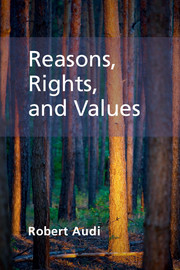Book contents
- Frontmatter
- Contents
- Preface
- Acknowledgments
- Introduction: practical reason, moral justification, and the grounds of value
- PART I REASONS FOR ACTION
- PART II INTUITION, OBLIGATION, AND VIRTUE
- 5 Intuitions, intuitionism, and moral judgment
- 6 Kantian intuitionism as a framework for the justification of moral judgments
- 7 Moral virtue and reasons for action
- 8 Virtue ethics in theory and practice
- PART III RELIGION, POLITICS, AND THE OBLIGATIONS OF CITIZENSHIP
- Index
- References
5 - Intuitions, intuitionism, and moral judgment
from PART II - INTUITION, OBLIGATION, AND VIRTUE
Published online by Cambridge University Press: 05 May 2015
- Frontmatter
- Contents
- Preface
- Acknowledgments
- Introduction: practical reason, moral justification, and the grounds of value
- PART I REASONS FOR ACTION
- PART II INTUITION, OBLIGATION, AND VIRTUE
- 5 Intuitions, intuitionism, and moral judgment
- 6 Kantian intuitionism as a framework for the justification of moral judgments
- 7 Moral virtue and reasons for action
- 8 Virtue ethics in theory and practice
- PART III RELIGION, POLITICS, AND THE OBLIGATIONS OF CITIZENSHIP
- Index
- References
Summary
Ethical intuitionism has now taken a place as a major position in contemporary ethical theory. But there is still a widespread impression that the view depends on concepts and theses that are insufficiently clear for the work they must do or, if clear enough to sustain the view, then not plausible. One question here is what constitutes an intuition. Another is how intuitive cognitions differ from inferential ones. There is also a need to address the question of just how ethical intuitionism depends on the answer. This paper addresses all three questions and, in the light of what we find in pursuing them, explores the resources of intuitionist ethical theory for providing an understanding of how moral judgments may be justified.
I The nature and varieties of intuitions
Intuitions are important not only for intuitionist ethical theories but also for philosophy in general. Indeed, even many philosophers who do not speak of intuitions theorize as if they were in part seeking to provide an account of shared intuitions, say intuitions about knowledge or obligation. They are what we might call intuitivists. An intuitivist must be responsive to intuitions, but need not be an intuitionist. The term ‘intuition’ is, in any case, not crucial for understanding intuitionism. The main point is that philosophy, like any theoretical enterprise, requires data, and intuitions are crucial philosophical data. For Rawls among many others, our data include the “considered judgments” that, when suitably placed in reflective equilibrium with principles of justice, confirm the latter. The judgments constituting our data at least roughly fit the characterization of (cognitive) intuitions to be given shortly.
I am taking intuitionism as an ethical theory to be, in outline and in a minimal version, the view that there is at least one moral principle that is non-inferentially and intuitively knowable. Historically, intuitionists have also posited what they consider an irreducible plurality of such principles, and I propose to call this stronger view, on which there is a group of at least several such moral principles (such as we find in W. D. Ross and others) generic intuitionism.
Information
- Type
- Chapter
- Information
- Reasons, Rights, and Values , pp. 129 - 159Publisher: Cambridge University PressPrint publication year: 2015
References
Accessibility standard: Unknown
- 1
- Cited by
